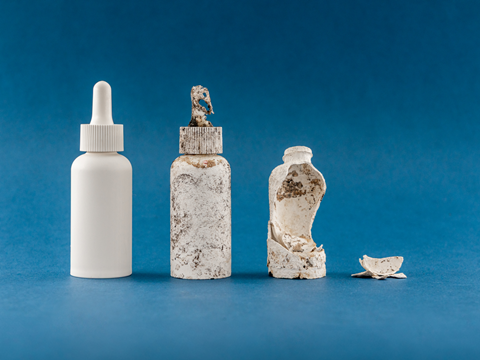
Shellworks claims to have developed the ‘world’s first’ fully home-compostable pipette dropper for products in the beauty and wellness sectors, stating that its compostable solutions have replaced over 90 tonnes of conventional plastic so far.
Traditionally, pipette droppers used for serums, oils, and other wellness products are made from glass, rubber, plastic, and other fused materials. Due to their size, they tend to fall through gaps in recycling equipment, meaning they end up in landfills or incineration facilities; Shellworks suggests that they constitute ‘millions of units’ of waste every year.
Its solution is to manufacture droppers with its Vivomer material, in which plants and other waste biomass are fermented into a ‘plastic-like’ material. Vivomer is believed to be free of plastics, petroleum, and toxic additives.
The material is said to mimic the properties of glass, ceramic, plastic, and rubber in one, meaning it remains completely stable during its use. It is designed to start biodegrading only when placed in a home compost environment, and since the whole product is said to come from the same origin, it is said to break down evenly.
Alternatively, the pipette is believed to break down in landfill at a similar rate to cellulose.
Shellworks raised £4.6 million in seed funding in 2022, which it has used to help develop the product. Since then, its biodegradable packaging solutions have been utilized by brands such as Wild, Abel, Eclo, People Care. Planet Care. (formerly Haeckels), and Sam McKnight.
The company now says it is capable of producing 2.4 million units of its dropper solution every year, with expansion capabilities anticipated to meet growing demand. It claims that it is currently in conversation with ten brands across the UK, EU, and US to scale its products across the industry.
Amir Afshar, co-founder and chief product officer at Shellworks, said: “Brands no longer have to choose between sustainability and shelf appeal.
“We designed this dropper to feel as good as it looks, and to disappear responsibly when it’s no longer needed. This represents a fundamental shift from sustainability as an add-on to sustainability as the foundation of product design.”
Dr Jay Gaston, materials lead at Shellworks, added: “We engineered Vivomer to be a truly industrial material- it’s precise, resilient, and beautiful when moulded.
“This dropper proves that even the smallest, most technical packaging challenges can be solved with the right material platform.”
Shellworks was a finalist under the Commercialized Renewable Materials category of last year’s Sustainability Awards, nominated for its Vivomer home compostable tub made by microorganisms.
In other news, Citizens of Soil has utilized Notpla’s seaweed-based, plastic-free material to launch single-serve pipettes for its Spanish Extra Virgin Olive Oil. The pipettes are said to be 100% natural, biodegradable, home compostable, vegan, and edible.
More recently, UKPACK has developed a recyclable ‘squeezed dropper’ for skincare oils and serums. Designed for precise, one-handed product application, it enables up to 50% post-consumer recycled polypropylene to be integrated into the bottle and cap.
If you liked this story, you might also enjoy:
The ultimate guide to the Packaging and Packaging Waste Regulation in 2025
How are the top brands progressing on packaging sustainability?
Everything you need to know about global packaging sustainability regulation in 2025
The key to increasing the use of reusable packaging in supermarkets














No comments yet